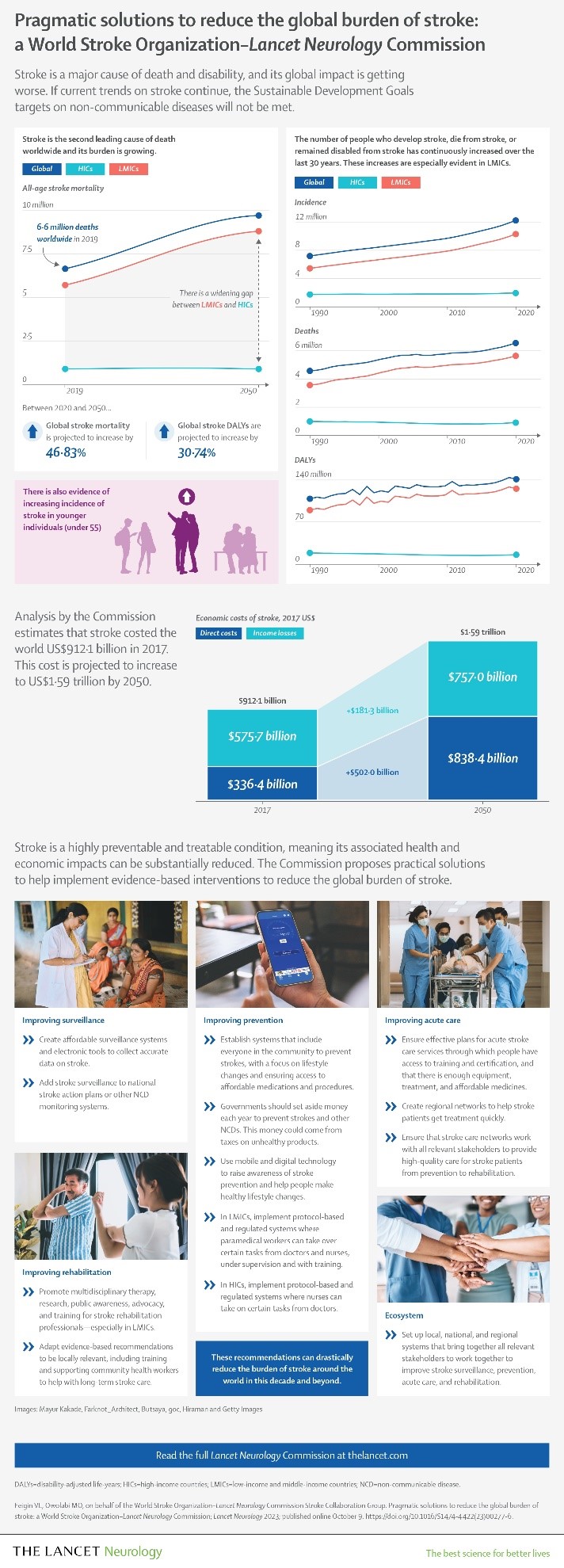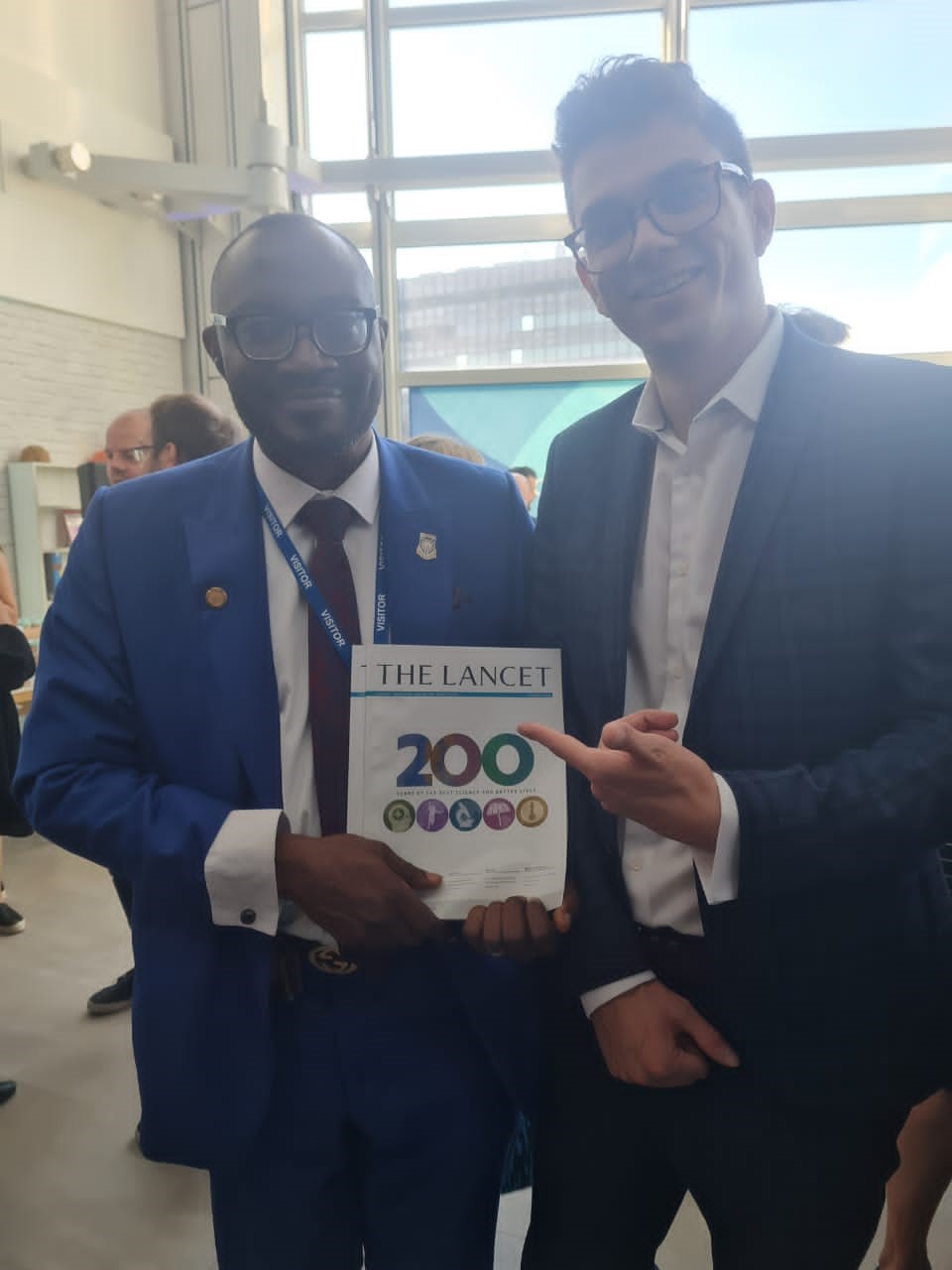Stroke could cause nearly 10 million deaths annually by 2050.
As alarming as this figure reads, it is an evidence-based forecast from the Lancet Neurology Commission on stroke. These deaths are likely to occur mostly in low- and middle-income countries (LMICs) and cost up to US$2 trillion per year, the new report warns. The Commission did not just drop this bombshell of the future epidemiological and economic impacts of stroke, they went on to suggest pragmatic recommendations and measures to reduce the global burden.
Worldwide, stroke is the second leading cause of death, the third leading cause of disability, and a leading cause of dementia and depression. Stroke results from the sudden death of some brain cells due to lack of oxygen when the blood flow to the brain is lost by blockage or rupture of an artery to the brain. The Lancet Commission on Stroke was initiated by Professors Walter Johnson and Mayowa Owolabi in 2016 and supported by the World Health Organization (WHO) and the World Stroke Organization. It is made up of 322 other Commissioners drawn from 84 countries.
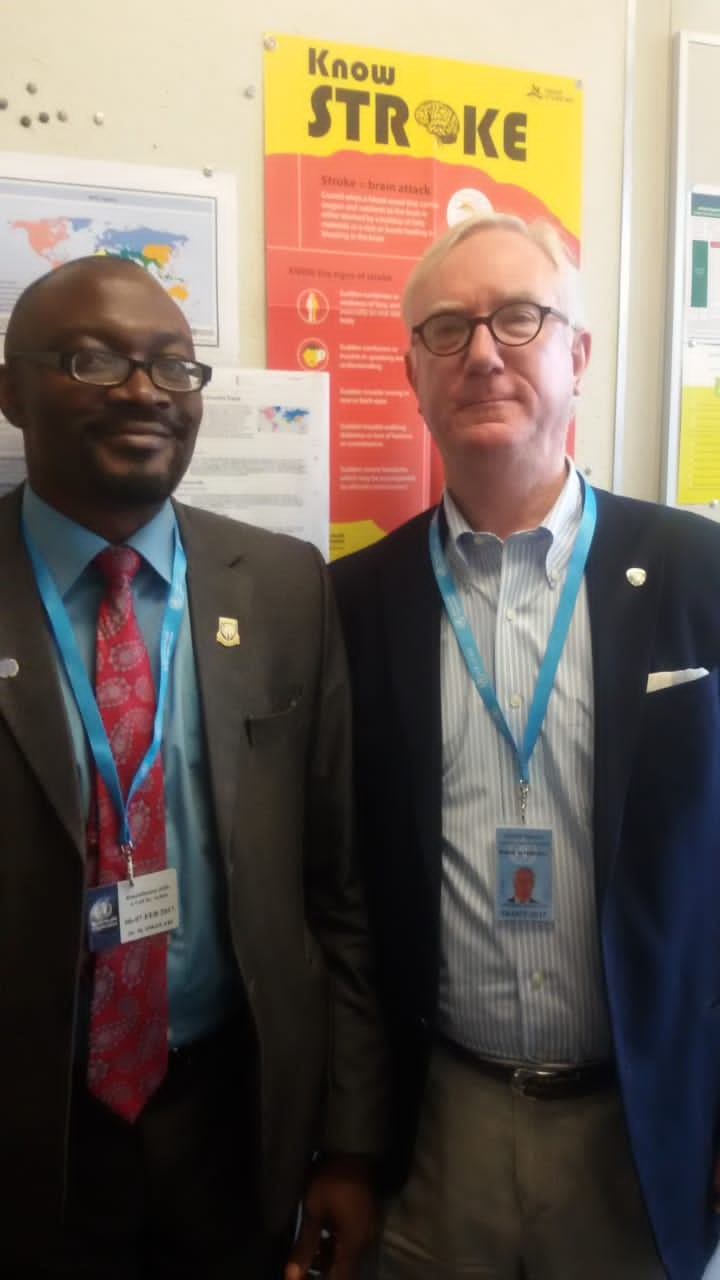 Birth of the Lancet Commission: Professor Mayowa Owolabi with
Birth of the Lancet Commission: Professor Mayowa Owolabi with
Professor Walter Johnson at WHO Headquarters in Geneva
Epidemiological analysis projects stroke deaths will increase from 6.6 million in 2020 to 9.7 million in 2050 with an ever-widening gap between LMICs and high-income countries (HICs). This is disturbing especially when one considers the fact that stroke is highly preventable and treatable. In essence, if the recommendations of the Lancet Neurology Commission are adhered to, there would be a drastic reduction in the global burden of stroke and eventually in the projected number of deaths as a result of stroke.
To avoid a 50% increase by 2050 in the number of people who die from stroke (the projected 9.7 million deaths per year) urgent action needs to be taken. According to Professor Valery L. Feign, of Auckland University of Technology, New Zealand, and Co-chair of the Commission, stroke exerts an enormous toil on the world’s population, leading to the death and permanent disability of millions of people each year, and costing billions of dollars. Precisely forecasting the health and economic impacts of stroke decades into the future is inherently challenging given the levels of uncertainty involved, but these estimates are indicative of the ever-increasing burdens we will see in the years ahead unless urgent, effective action is taken.
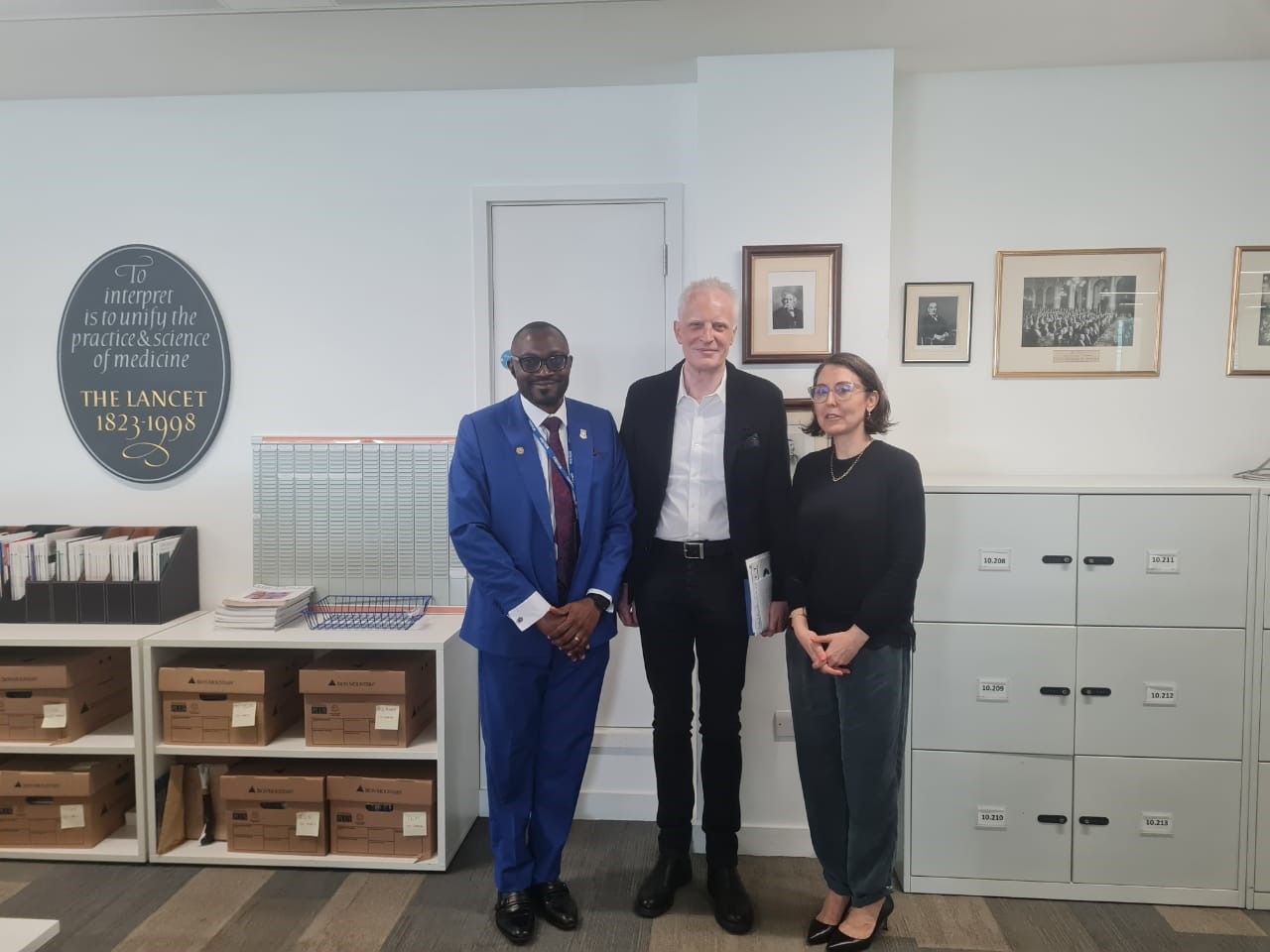 Historic Moment: Lancet's 200th Anniversary Celebration with Prof. Mayowa Owolabi,
Historic Moment: Lancet's 200th Anniversary Celebration with Prof. Mayowa Owolabi,
Editor-in-Chief of The Lancet, Richard Norton, and The Editor-in-Chief of The Lancet Neurology,
Elena Becker-Barroso at the Lancet Office in London on 6th October, 2023.
The aim of this forecast is not to shock or raise false alarms but to give early warning signs and spur action so that this burden can be efficiently handled. In stemming this trend of a devastating increase in stroke deaths and illness burden, the Commission will also be addressing the WHO Sustainable Development Goal 3.4 which aims to reduce the 41 million premature deaths from non-communicable diseases, including stroke.
Among the major barriers to achieving the goal of curtailing the scourge of stroke is the abysmally low level of awareness of stroke and its risk factors. Among the predisposing factors to stroke are high blood pressure diabetes mellitus, high cholesterol obesity, unhealthy diet, sedentary lifestyle, and smoking. In this instance, ignorance is not bliss but rather an invitation to death. Hence, there is also an exigent need to raise public awareness and action to improve healthy lifestyles while shunning risky behaviours.
One fundamental move in the right direction is what Lancet has embarked on by harnessing the forte of well–developed stroke organizations and networks so as to build capacity for stroke care and research, and universal health care providing population–wide access to evidence-based stroke care. This alliance is a formidable scheme that will be of immense benefit to the fight against stroke.
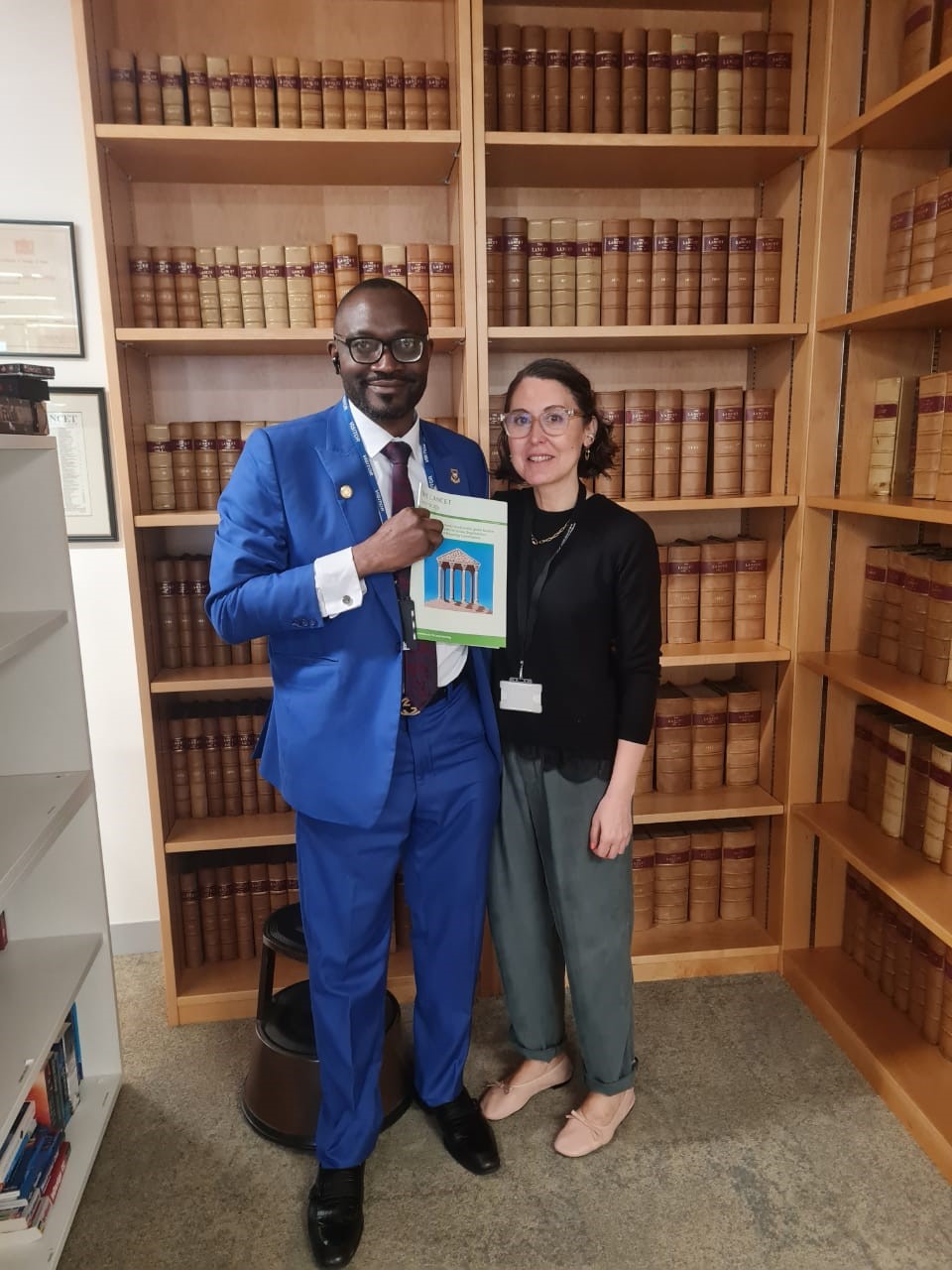 Professor Owolabi with Elena Becker-Barroso in the Lancet library.
Professor Owolabi with Elena Becker-Barroso in the Lancet library.
In the background is the first issue of The Lancet published in October 1823.
Professor Owolabi is holding the just published Lancet Commission on stroke.
Also of great importance is the need to prioritize effective planning of acute stroke care services, capacity building, training, provision of appropriate equipment, treatment, and affordable medicines, and adequate resource allocation at national and regional levels. In fact, for the LMICs in particular, for these global efforts to yield expected outcomes, as a matter of urgency, community health workers need to be trained, supported, and supervised to assist in prevention, early recognition and long-term stroke care.
Furthermore, in terms of policy engagement, the Commission recommends introducing legislative regulations and taxation of unhealthy products (such as salt, alcohol, sugary drinks, and trans-fats) by each and every government in the world. They believe such taxation would not only reduce consumption of these products but also lead to the reduction of the burden from stroke and other major non-communicable diseases. This measure would also generate a large revenue that can be used to fund prevention programmes and reduce poverty and inequality in health service promotions. All these together will improve the wellbeing of the population as funding is said to be one of the most common problems in implementing stroke prevention and care recommendations.
Professor Mayowa. O. Owolabi of the University of Ibadan, the Lead Co-chair of the Steering Committee of The Commission submits that “investing in evidence–based measures to reduce the global burden of stroke will deliver benefits far beyond health alone…many of our recommendations would also facilitate reductions in poverty and inequality and boost local economies.” He further stated that stroke is, ‘’substantially preventable, treatable, and beatable” using the pragmatic solutions recommended by the Lancet Commission to address this global challenge across the four pillars of the stroke quadrangle: surveillance, prevention, acute care and rehabilitation.
Watch the final video cut of the presentation here:
The video is also embedded on The Lancet website at: www.thelancet.com/commissions/global-burden-stroke.
Pragmatic Solutions to reduce the global burden of stroke: a World Stroke Organization - Lancet Neurology Commission (Infographic)
